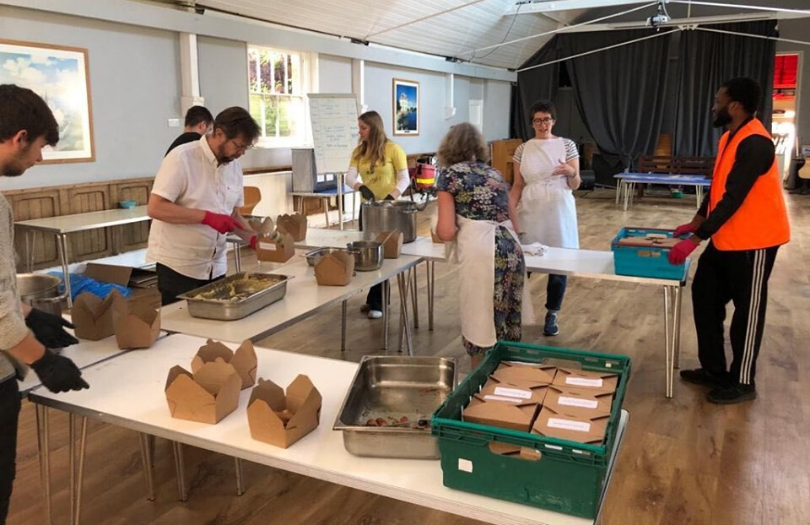
 ACT is a small charity in Oxford providing housing and support for people at the margins of society: homeless people, ex-offenders, and people struggling with mental health. Their outreach work centres on providing accommodation and food, in particular weekly communal meals.
ACT is a small charity in Oxford providing housing and support for people at the margins of society: homeless people, ex-offenders, and people struggling with mental health. Their outreach work centres on providing accommodation and food, in particular weekly communal meals.
The charity is affiliated with St Aldates Church and has around 100 volunteers. ACT manages 12 houses on behalf of landlords, where they provide tailored support for ex-offenders and formerly homeless people, preparing them to transition back into society. This includes regular house visits, mentoring, a cooking club, volunteering opportunities, budgeting advice and pastoral support. In particular, the charity provides a sense of belonging and community by offering regular shared Sunday lunches and dinners.
When the coronavirus pandemic hit the UK in April 2020, ACT found themselves having to rapidly adapt their services. For example, instead of carrying out face-to-face work with people living in their supported housing, this mentoring, moral support and training is now happening by phone and online – a departure for the charity, which in the past has discouraged too much use of the internet for its residents for fear of them being led astray or suffering from depression. Now it is providing crucial regular contact with the Housing Support Team to ensure continuity of care and the vital social connection that ACT specialises in.
ACT has also been innovative in responding to the emergency situation, realising that food provision for rough sleepers in the city would be put into peril by the lockdown. Surplus food usually provided by cafes would no longer be available, and some charitable provision would be unavailable if charities experienced a drop in income and had to furlough staff, or could not provide a safe environment for their usual volunteers. Oxford City Council was able to move almost all rough sleepers into hotel accommodation – but those establishments were not opening their restaurants.
ACT persuaded St Aldates Church to give them access to its commercial kitchen – usually used for events – along with their chef, so that meals could be provided for the immediate period before provision started to open up again. ACT mobilised its volunteers to prepare, pack and deliver the meals, with 50-75 hot meals being provided every day to homeless people across Oxford.
One grant from OCF’s Coronavirus: Community Resilience Fund has enabled ACT to provide hot meals for two months – as opposed to one week, which is what the charity had funds for initially.
OCF has also funded ACT to buy tablet computers to help them keep in touch with their residents, as well as laptops for Housing Support Workers, so that they could quickly switch to working from home when the lockdown was announced. Being able to use video calls means that staff can give practical and emotional support, but also see inside the accommodation to make sure everything is okay and the residents are coping with the lockdown situation. This IT infrastructure will stand ACT in good stead when it comes to recovering stronger from the coronavirus crisis.
ACT’s work in this area, particularly around quickly finding shelter for all rough sleepers, has hinted at what their Chair of trustees dubs a potential ‘silver lining’ to the coronavirus crisis: “There are a lot of rough sleepers around Oxford, and because of the crisis the Government has asked all councils to try and get those people off the streets. The vast majority of them have now got a roof over their heads – and there’s a lot of research that shows that if you can provide a roof and a warm, safe place, all the other problems that they face, which might have pushed them onto the street in the first place, can start to be addressed much more easily when they’re no longer worrying about keeping themselves safe and warm.
“We’ve had relationships with people on the streets for years, and they’ve refused to come off the streets. But we’ve found that every now and then you get a breakthrough, and if somebody can be housed for about 12 weeks and we can manage to support them, they start to get their life together in other dimensions, and they start to realise that there is a way out. So my hope is that all of the people who are being housed through the crisis as a result of all the agencies around the city working together – maybe a lot more of them will find an escape route.”
Chris also points out that whilst the multiple homelessness charities in Oxford have historically been careful not to compete with one another, the present crisis has seen them work genuinely collaboratively together with a new energy – and to do so very closely alongside statutory health and social care services, as well as the police and the council: “I think the amount of collaboration and willingness to get things done has really risen quite sharply because of this crisis and this sense of urgency. Maybe we can remember that so that things don’t back to the old way – but a different normal where we work together more pragmatically and get things done.”
Both of these concepts – the ‘housing first’ model and long-term collaboration – are being explored proactively as part of OCF’s Oxfordshire Homeless Movement partnership. The lessons from the coronavirus experience seem to suggest this is just what is needed to make a genuine and lasting difference to homelessness in Oxford.
ACT’s COVID-19 response
For their project funded by the Homelessness Prevention fund, ACT’s overall aim was to give people a safe place to live first and ensure they receive intensive and bespoke support, with the ultimate aim that they become responsible, recommendable tenants.
The project gives a two-way benefit as they can demonstrate to Oxford’s property owners a successful, replicable working model. Where a property they own is efficiently run by ACT’s Housing Team, they receive a guaranteed agreed rental income and their investment supports a long-term transitioning away from homelessness.
The ACT team, which includes volunteers who are former rough sleepers themselves, helps build trust and connection. They develop strong, supportive relationships with each tenant, with a focus on long-term change. Experience shows that consistency of support helps people break free from damaging and long-entrenched patterns of behaviour and gives them the hope and quality of support they need to rebuild their life.












